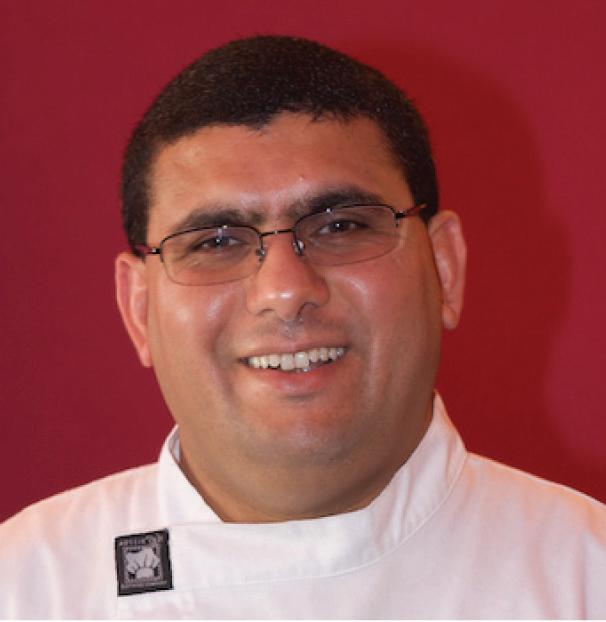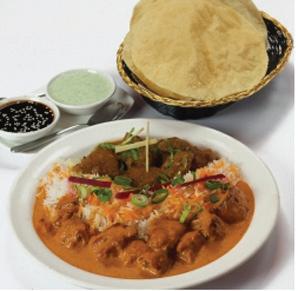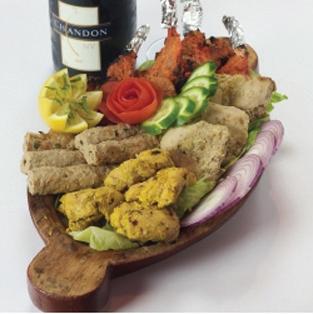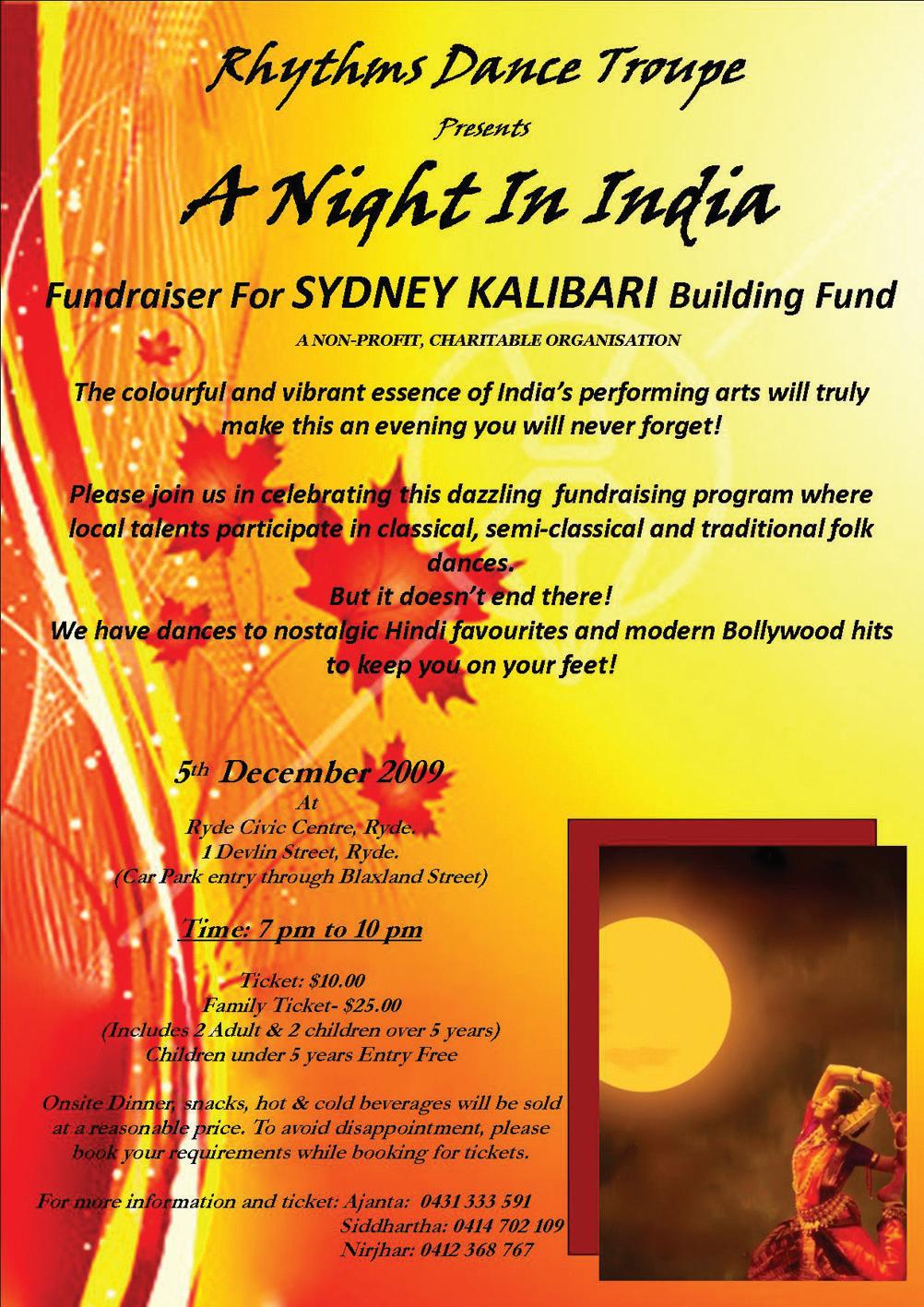
6 minute read
Salaam Bombay
from 2009-11 Sydney (2)
by Indian Link
In a tribute to the spirit of Mumbai on the first anniversary of 26/11, SHAILAJA CHATURVEDI calls for more to be done to rid the world of terrorism
(On the pyre of the patriots every year, there will be a celebration of their life; this will be the lasting memory of those who died fighting for their country)
“Now the smoke has cleared, a different fire is burning within us, to rebuild the glory. Taj will stand tall like India for years”.
So went the page long message from Taj Mahal Palace and Tower as published in the The Times in India nearly a year ago.
A year after the devastation, Mumbaites have lived up to the pledge they made.

Only days before, we had watched helplessly the audacity of terrorists as they tried to polarise a pluralist democratic society, in a 60-hour long murderous rampage.
India’s iconic city had become a spectacle as its dignity lay violated, in a macabre reality show.
International terrorism threatens the very existence of democratic and secular states. Terrorists change the rules of civilisation. We must develop massive resources and network both locally and globally to bring in radical changes to combat those who have such little regard for human life.
After Iraq, Indians had the highest number of terrorist casualties. Since 1993 when 13 serial blasts brought the country to a standstill killing 250 people, India has endured continuing threats and violence. It combats nationally with Muslim terrorists from Kashmir, Sikhs of Punjab, Christians of Nagaland, Hindu extremists from Assam, and Naxalites across the country. Major terrorist attacks have occurred in recent years in Mumbai, Delhi, Jaipur, Ahmedabad, Banglore and Assam. The frequency, intensity and spread of attacks have steadily increased, culminating in the bloodiest battle on 26/11. The human cost here was immeasurable and the property damages ran in billions.
India has now conceded that we have crossed the line of peaceful reconciliation. India, US and Pakistan’s all-weather friend China must devise a marshall plan for Pakistan to pull out of the chaos for the sake of its own people.
The Pakistani economy lies in dire straits. A chaotic and fractured country, it seems dominated by rogue elements from its military and intelligence services, behind a weak civilian leadership façade. Much of the global terrorism today emerges or is planned in this country, which also shelters many of the most wanted terrorists, allegedly under its security forces. The Inter Services Intelligence (ISI), a wing of the Pakistani army, it has been alleged, helps the corrupt military establishment keep its stranglehold on power by citing external threats and warning bluffs. It has remained reluctant to intensify its operation against fundamentalist and radical Islamist Jihadi fighting in Kashmir and Afganistan, Al Qaida, Taliban and other tribal militants as demanded by India and the US. It seems the ISI and the Pakistan military remain beyond the control of civilian government. (Following intense international pressure President Asif Zardari admitted that extremist and radical Muslim groups - not India - are the biggest threats to Pakistan).
Nevertheless in any attempt to subdue the rising militancy of the ISI, the democratic government and the civil society of Pakistan must be considered first, which has remained the reasons behind India’s reluctance to retaliate. Although Indians have learnt to endure the devastation of terrorism over the centuries, perhaps the time has come to wisely and tactfully use strength, albeit with caution.
In the carnage of 26th November 2008, the ISI supported Lashkar-e-Toiba (LeT) was identified as the major perpetrator, though this was vehemently denied by the Pakistan government till recently. Its intense indoctrination process of recruits from poor families with troubled childhood, petty criminal history and promise of 2-3 lakh rupees as reward, converted disenchanted individuals into militant rebels. Insulated from the outside world their training began in 2007 in Lahore. They lived in and around Mumbai, as part of their rehearsal for 6 months, as Malaysian students helped by the underworld Indian Mujahideen and Students of Islamic Movements of India (SIMI) according to secret information. Early in 2008 they returned to Lahore and remained in intense training for 3 months followed by a month long luxury holiday. The specific group of well-groomed 10 terrorists then moved to Karachi in September for further training by the LeT. They were trained with precision as commandos, watching the videos of the targets in Mumbai and learning the economy of fire power and discipline of communication. They were dispatched in groups to Mumbai a month before the attack, prepared to kill 5000 people with insensitivity, and destroy Mumbai. In the 60 hours of siege, more than 200 were killed, 400 were seriously injured and the cost of property damage was estimated beyond US $20 billion. This was the most daring open confrontation where the attackers did not cover their face.
India’s external intelligence agency RAW (Research & Analytical Wing) intercepted a satellite phone conversation a week before the attack referring to an imminent terror strike on Mumbai via sea route. US warning a month before, included the Taj for a potential maritime attack. Security was tightened for the potential attack on 27th September (27th day of Ramzan) and relaxed on 18th November 2008 due to “no actionable intelligence”.
In the aftermath of “war torn” Mumbai, fingers were pointed towards the mismanagement of Indian Government which indeed must reflect on its role in protecting India, where police (amongst the lowest per population in the world) are largely employed as the crowd managers of politicians of little real risk. Shiv Sena, a rising extremist group has complicated the politics even further by attempting to separate Mumbai from the rest of the country, yet in the time of need the commandos were called from north and south, the states barricaded by Shiv Sena. The Indian community was rightfully enraged by the 18 hours of delay in getting the commandos on the scene. The comments made by the Chief Minister of Kerala and some politicians from Maharashtra were enough to salt the wound resulting in their widespread condemnation from the grief-stricken nation.
In the midst of the devastating tragedy it was heartening to see the instant solidarity of the people of India. The Muslims of India declined to bury the terrorists on their soil. Jameeyat Ulema e Hind declared the attack as “war against
Islam” to tarnish the image of Muslims around the world.
Sahara India pledged to give five times the monthly salary to the families of those who sacrificed their life fighting for the country. There was overwhelming response to secure the future of families and the country in rebuilding itself.
Although the last 12 months have seen many desirable strategies emerge to combat terrorism, Pakistan remains unwilling to prosecute Hafeez Saeed, the mastermind of 26/11. Pakistan’s obsession for parity with India has not only destroyed its relationship with its neighbouring countries, but has stunted its political and civilian growth.
India has maintained its dignity, abiding by the ethical, moral and legal principles in its investigations and in bringing the culprits to justice, albeit in an assertive manner. India has never deviated from harmony and peaceful coexistance, the core of our civilisation. (Despite China’s continued hostility, for example, India has declared that there is enough space for India and China to grow together). India has pledged to help its neighbours with political devolution packages that satisfy the aspirations of Tamils in united Sri Lanka and help Nepal for its democratic forces to work together through peaceful means.
India is equally eager to help Pakistan eradicate its poverty and terrorism and emerge as a modern, prosperous and powerful nation. Unfortunately Pakistan remains a terrorist sanctuary where training camps are dispersed along the India Pakistan border. Mumbai terrorists came from the heartland of the country.
It is disappointing that between the Indian parliamentary attack of 2001 and the Mumbai attack of 2008 at least $ 20 billion were given to Pakistan as US aid without any rigid condition, 90% of which has gone into military rather than any development project. Pakistan is the largest recipient of US aid in the world. One must question the international aid which seems like a ransom paid to the militants for self interest.
Bridging the gap and not capitalising on it must underpin any endeavour of progress and friendship.
As the investigations continue and strategies are planned to fight terrorism, we must also make individual contributions for a safer world where goodwill, integrity, honesty and mutual trust are valued and prevail. No innocent life should be sacrificed in the hands of ruthless vultures.
I salute the indefatigable spirit of India which continues to give strength, courage and pride to rejuvenate, to all those who call India home.
Pleasant Ambeince, Freindly staff 421 Cleveland Street, Surry hills, Nsw 2010.
Experience warm hospitality along with traditional Indian cuisine at Curries in Surry. The broad menu has a tempting range of fresh Tandoori dishes along with authentic curries, Mouth watering Chaats, & many meat and seafood options. The total Indian Experience and expertise subtle ingredients and native methods which, when brought together, stimulate, inspire and produces exotic flavours.. . Open for lunch Wed to Sun & dinner 7 days.



Opening specials Buy one entree and one main and half your bill, valid for november month only. Please rush for the offer for groups (Booking essential) on 866858666


Celebrate your birthday and receive free birthday cake













